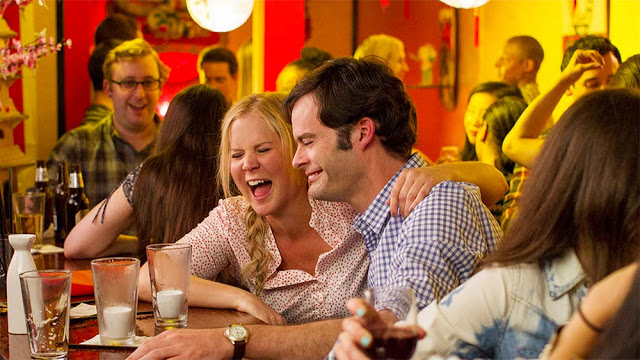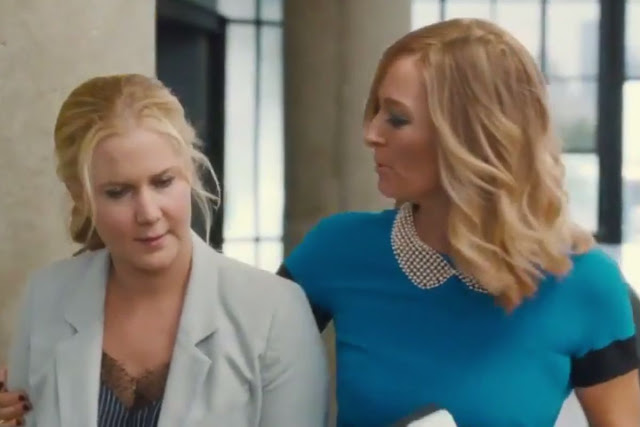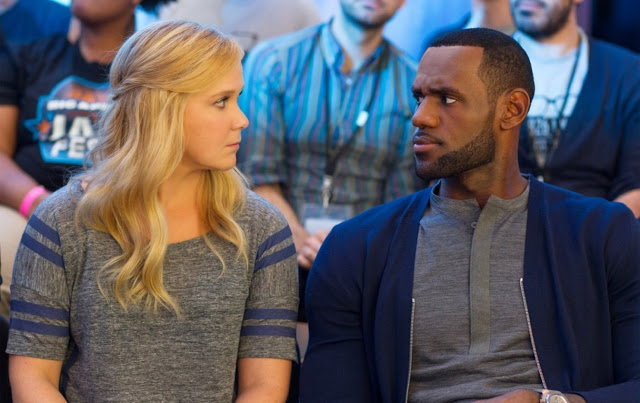They may both tower over the modern comedy world, but Judd Apatow and Amy Schumer aren’t very much alike. Apatow’s works, particularly The 40-Year-Old Virgin and Knocked Up, are best known for the overgrown man-children at their center, but they’re also curiously wholesome and sweet. He relies heavily on crudity and profanity, but he does so in the service of a romantic ideal—the notion that love can conquer all obstacles and generate true happiness—that is pure, cornball formula. But Schumer is a deconstructionist. She has ascended to the apex of the comedy landscape precisely because of the way she obliterates formula, exposing stereotypes and upheaving convention. Trainwreck, which Apatow directed from a script written by Schumer, is the funny, fascinating, and somewhat frustrating attempt to reconcile these two disparate voices into a unified song. Like its protagonist, it is often at war with itself. And, like its protagonist, it is vulgar, confused, warmhearted, and generally a hoot to hang out with.
Schumer plays Amy (in case you doubted the story’s autobiographical bona fides), an unapologetically promiscuous boozehound whom one might call a slut or a female stud, depending on one’s level of sexism or enlightenment. The idea that women can be funny, frisky, and lewd should hardly have been a revelation in 2011, but it was novel enough to turn Bridesmaids (which Apatow produced) from a well-made, modest comedy into an outright phenomenon. Now, Trainwreck extends that sense of gender liberation to the bedroom. That’s where we first meet Amy, tumbling between the sheets with an anonymous schmo, extracting pleasure from him before feigning sleep to avoid the obligation to reciprocate. “Don’t judge me, fuckers,” she admonishes via voiceover. It’s an odd plea, given that she spends most of the movie judging herself.
Judgment is also part of her job. Amy works at S’Nuff, a Maxim-like New York rag that runs pieces about things like the efficacy of masturbating in the office, and other intellectual matters. At an early pitch meeting—which features some lively and perverse banter among Amy and her colleagues, played by comedy all-stars Jon Glaser, Vanessa Bayer, and Randall Park—Amy’s boss, Dianna (an unrecognizable Tilda Swinton, clearly relishing her vacation from the art house), assigns her a story about Dr. Aaron Conners (Bill Hader), a surgeon who works with high-profile athletes. Amy is not especially enthused about the assignment—when pressed, she identifies one of her favorite sports teams as “The Orlando Blooms”—but her meeting with Aaron instantly produces an awkward, tentative connection that can only be called chemistry. And just like that, Trainwreck transforms from an intriguingly spiky character study into a pleasingly familiar romantic comedy.
This is a mild bummer, at least for those hoping to bask in Schumer’s more anarchic approach to entertainment. She’s built her reputation knocking down walls, but while Trainwreck is many things—sidesplitting, sweet, scattered, sentimental—it is not especially groundbreaking. The trajectory of Amy and Aaron’s relationship—the meet cute, the blissful montage, the painfully contrived fights and complications, the syrupy conclusion—is lifted straight from the rom-com playbook. But that’s OK, and not just because Schumer and Hader exhibit a playful and winning rapport. There is so much going on in Trainwreck‘s margins that its central love story almost feels secondary. To begin with, Amy’s relationships with her discerning sister (Brie Larson, an anchor amid stormy seas) and dyspeptic father (Colin Quinn) feel nurtured and lived-in, suggestive of deep familial bonds and wounds. And while a significant plot point is heavily foreshadowed in retrospect, it still shocks in the moment, and it produces a scene of surprising, stirring poignancy. It also illustrates that Schumer isn’t just a behind-the-scenes force of creativity; she can act, too.
Speaking of actors, Apatow has acquired the cachet to round out Trainwreck with first-rate performers (did I mention that Tilda Swinton plays Amy’s boss? How about Dave Attell as a gregarious bum, or Daniel Radcliffe and Marisa Tomei appearing as the leads in a faux-prestige picture called The Dogwalker?), but his masterstroke here is the casting of someone who isn’t an actor at all. Every romantic comedy requires each lead to take counsel from a same-gendered foil, but Aaron’s loyal companion turns out to be none other than LeBron James. Celebrity athletes have a long and infamous tradition of phoning in lame cameos in big-budget productions—Trainwreck itself features wooden performances from Tony Romo and, even stranger, Amar’e Stoudemire, whose purported stature as an NBA superstar suggests the movie actually takes place five years ago—but James is something else. He’s actually playing an alternate version of himself, and the results are uniformly hysterical. It isn’t just that he’s outrageously parsimonious (one of the film’s biggest laughs comes when he insists on splitting a meal with Aaron, then pretends to have forgotten his wallet), or that he casually demolishes Aaron in one-on-one hoops, or even that he’s an unabashed Downton Abbey devotee. It’s that he’s ardently supportive of Aaron’s love life, whether it’s reacting with glee to positive developments or interrogating Amy, stone-faced, about her “intentions”. It’s testament to Schumer’s talent, and to the vibrancy of Amy’s character, that James doesn’t steal the movie from her completely.
Of course, there is plenty to go around for everyone. Apatow is peerless in fusing his juvenile impulses with his romantic ones, but he remains willfully undisciplined in the editing room, letting scene after scene play out long beyond its expiration date. (His prior film, This Is 40, often felt like an extended gag reel.) He encourages his actors to improvise heavily, which yields wildly uneven results. To be fair, Trainwreck is often hilarious, as when Amy encourages Steven (the wrestler Jon Cena, playing nicely against type), her pre-Aaron squeeze, to talk dirty during sex, or when Dianna berates Bayer’s character for her nervously plastered smile. But some parts are downright painful. Amy’s disastrous dalliance with an intern (Ezra Miller—Apatow must have really liked We Need to Talk About Kevin) feels like a deleted scene from Superbad, while a bit in a movie theater where Steven fires inadvertently homoerotic threats at a fellow patron lurches in search of a punch line that never arrives. There’s even a mindboggling sequence where James, Chris Evert, and Matthew Broderick attempt to stage an intervention, with Marv Albert doing live play-by-play. Those stunt appearances suggest that Apatow is abusing his success; just because you have the ability to pepper your movies with celebrities doesn’t mean you need to.
Still, the hits easily outnumber the misses, and dead spots aside, Trainwreck is legitimately funny. Plus, it’s fundamentally sweet at heart. There’s an adorable moment where Aaron asks Amy if she wants to go eat “raviolis”, and Amy’s affection for her bumbling suitor just radiates on Schumer’s face. Yet where The 40-Year-Old Virgin and Knocked Up felt like the pinnacle of comedic sappiness, the sweetness tastes a bit sour this time around. Perhaps I’m demanding too much from Apatow, but given that he’s working with as gifted and radical an artist as Schumer, it’s difficult to be satisfied with consistent laughs and sturdy execution. Trainwreck is a good, enjoyable, often uproarious movie, but it could have been better (and bolder) had it transcended rom-com tropes, rather than simply standing as a preeminent example of the genre.
“A woman’s life is worth nothing unless she’s making a great man greater,” Schumer said to Josh Charles in “The Foodroom”, a sketch on her TV show and a light-fingered, quietly savage rebuke of the industry’s entrenched patriarchy. But while Trainwreck takes great pains to present a furiously messy feminine hero, it ultimately adheres to Apatow’s safe and conventional ideas about romantic bliss. Amy is smart, funny, and defiantly herself, but in the end, she still needs the love of a man in order to be truly happy. This doesn’t make her happiness any less earned, or less rewarding, but it does make it more ordinary. Apparently, at the movies, love really does conquer all. Even Amy Schumer.
Jeremy Beck is the editor-in-chief of MovieManifesto. He watches more movies and television than he probably should.




Great review! I loved it since it was te perfect mix of Amy and raunchy. It's as if Meg wrote the movie. I was impressed that even the "run back to me and embrace" portion a la The Notebook was outlandish. I see your point about it being a funny version of the standard rom-com, but I think viewers would have been depressed if it ended any other way.